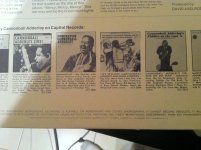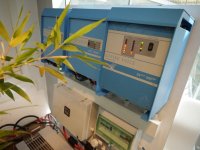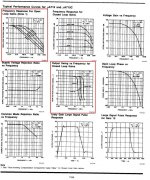John,
I don't think anyone has a problem with you making your living designing audio circuits. Somebody has to do it. But that doesn't mean that those who don't make their living at this don't know how to do it.
Let's put it this way, I had one of my cars at the mechanic's, he is paid, therefor he is a professional right. Well he had my car forever and changed component after component trying to solve an electrical problem. He never could solve the problem. I finally said let me have it, I hadn't wanted to work on it since I hate working on new cars, they have no damned room for your hands, the packaging is terrible, but I brought the car home. Guess what, I had the car running in a few minutes and solved the intermittent electrical problem by doing careful troubleshooting. Who was the true professional in that instance? Yes I was a licensed smog and brake and front end mechanic when I was a kid and can still work on any car, so I was the true professional, I understood the electrical circuits and he like most mechanics only knew how to replace parts and hope for the best. I checked every circuit, checked and cleaned every ground connection and checked all the sensors methodically. Mechanics just won't spend the time and very few I have ever met actually have any understanding about the electronics. Not saying all of them, but most. So though I don't make a living doing that I made him look stupid. So how do you define professional.
I have no problem after knowing some of these guys backgrounds, JN, Scott, Pavel and others like RNMarsh can more than hold their own. Sy may not be an electrical engineer by trade but I wouldn't call him on his electronics chops! Me I can run circles around some in my own area but that is what life is about. Some of us like this as a hobby, I plan on selling into the market with my own speaker designs. Does that make me an amateur or a professional? If others have paid me to develop new cone materials what does that say, If have been paid to do that?
I don't think anyone has a problem with you making your living designing audio circuits. Somebody has to do it. But that doesn't mean that those who don't make their living at this don't know how to do it.
Let's put it this way, I had one of my cars at the mechanic's, he is paid, therefor he is a professional right. Well he had my car forever and changed component after component trying to solve an electrical problem. He never could solve the problem. I finally said let me have it, I hadn't wanted to work on it since I hate working on new cars, they have no damned room for your hands, the packaging is terrible, but I brought the car home. Guess what, I had the car running in a few minutes and solved the intermittent electrical problem by doing careful troubleshooting. Who was the true professional in that instance? Yes I was a licensed smog and brake and front end mechanic when I was a kid and can still work on any car, so I was the true professional, I understood the electrical circuits and he like most mechanics only knew how to replace parts and hope for the best. I checked every circuit, checked and cleaned every ground connection and checked all the sensors methodically. Mechanics just won't spend the time and very few I have ever met actually have any understanding about the electronics. Not saying all of them, but most. So though I don't make a living doing that I made him look stupid. So how do you define professional.
I have no problem after knowing some of these guys backgrounds, JN, Scott, Pavel and others like RNMarsh can more than hold their own. Sy may not be an electrical engineer by trade but I wouldn't call him on his electronics chops! Me I can run circles around some in my own area but that is what life is about. Some of us like this as a hobby, I plan on selling into the market with my own speaker designs. Does that make me an amateur or a professional? If others have paid me to develop new cone materials what does that say, If have been paid to do that?
Investigating a.wayne's post I came across this show report, Living Voice Vox Olympian - High End 2013 Munich -* The Audio Beat - www.TheAudioBeat.com - and an excellent description of the sound one should be chasing is contained within. The thing is, when the system really works properly all the normal adjectives get thrown in the bin, because they become irrelevant ...
I published this cap distortion back in 1978. What were you and your associates doing then?
I was doing a research and design on DC - xMHz measuring amplifiers for measurements during short-circuit tests of HV SF6 circuit breakers. Measurements of current and arc and transient recovery voltage in the vicinity of current zero, like 10 - 20 us overall time interval within 100ms test.
Maybe something was missed here. What I tried to tell is that you do not need to be an audio amplifier professional designer to understand component's issues like capacitor distortion etc. Opposite might be true. We used capacitors in combined RC dividers (measuring of transient recovery voltage) with series damped capacitive branch. We ended with R//(R-C) cells, 1:N divider had N + 1 cells. We experienced DA as a great issue and found polystyrene the best, mylar worse. Ceramics unusable for many reasons. Same results as you had. Plus, experience with capacitor surge voltage stress. Same stress on resistors, so we have collected information you would never get from datasheets. Audio had been my hobby these days, so I was (and probably still am) an amateur. However, I was able to transfer my experience with component's behavior into audio design and especially my experience with design of electronic instruments working under conditions of extreme electromagnetic interference fields. Also measurements of penetration of EMI into various coaxial cables. I would never get those findings if I was an audio designer only and I would not be able to reflect these findings in audio design.
P.S.: plus, we were aware of all the opamp SR issues, the only opamps we could use for our purposes, those days, were uA715 and uA733.
Last edited:
Does that make me an amateur or a professional?
Beyond the actual definition, what I absolutely abhor is the continuous use of the word 'amateur' as a deliberate derogatory term.
That is inexcusable for a 'professional' person, reflecting negatively more on the 'professional' than on the 'amateur'.
Jan
Beyond the actual definition, what I absolutely abhor is the continuous use of the word 'amateur' as a deliberate derogatory term.
That is inexcusable for a 'professional' person, reflecting negatively more on the 'professional' than on the 'amateur'.
Jan
+1
Folks, my 'fashion choice' this last week was distortion in Tantalum and Ceramic caps. Now, I knew that it was there, but did every one of you? It was just a simple test that I can count on, while I learn to use and trust the test equipment. I am also finding the distortion baseline under various conditions, such as different frequencies, etc. It is important to learn your equipment, before getting more 'exotic'.
Deja Vu.
How relevant was bringing that up again to anything...
I am reminded of the ac/dc lyric " what do you do for money what do you do for kicks" Amateur do this for the love of it pro do it for money and need to preform to a higher standard a level of professionalisum it seams.Beyond the actual definition, what I absolutely abhor is the continuous use of the word 'amateur' as a deliberate derogatory term.
That is inexcusable for a 'professional' person, reflecting negatively more on the 'professional' than on the 'amateur'.
Jan
need to preform to a higher standard a level of professionalisum it seams.
That is decidedly untrue. A pro in the fashion audio market is judged on how well he moves boxes. Period. He operates under constraints that "amateurs" don't. So it's not surprising that "amateurs" can achieve better results much of the time.
Jan,
I would tend to agree with you that most times when people use the term amateur it is either as a derogatory statement or a qualifier to make it appear that you shouldn't expect much from that person.
I tend to think that there are many people who are at the same level of so called professionals in many fields, they may actually have insights that the so called professionals would never consider as it would go against the accepted norms.
I would tend to agree with you that most times when people use the term amateur it is either as a derogatory statement or a qualifier to make it appear that you shouldn't expect much from that person.
I tend to think that there are many people who are at the same level of so called professionals in many fields, they may actually have insights that the so called professionals would never consider as it would go against the accepted norms.
With all due respect, John, but that is way too arrogant. You've just pi$$ed in too many people's pools, I must say.You are right, Kindhornman. IF you don't design audio for a living, then in my mind, you are an amateur. Of course, there are some exceptions, but very few in this crowd...
Do a quick search for RMS in this context...
.. and perhaps wonder as do I at the true meaning of the word professional where it is applied to some areas of product design and engineering?
This is well known to be true. However, in a properly polite debate or discussion some of these definitions and likewise their exact corollaries serve only the purposes of the issuer and are of negligible benefit or utility to a recipient.
If I was working on a Porsche I may just have a few choice words for the engineers, don't count on that! There is no perfectly designed car out there, none.
.. and perhaps wonder as do I at the true meaning of the word professional where it is applied to some areas of product design and engineering?
I was talking about your use of the word professional, that has many meanings.
This is well known to be true. However, in a properly polite debate or discussion some of these definitions and likewise their exact corollaries serve only the purposes of the issuer and are of negligible benefit or utility to a recipient.
Beyond the actual definition, what I absolutely abhor is the continuous use of the word 'amateur' as a deliberate derogatory term.
That is inexcusable for a 'professional' person, reflecting negatively more on the 'professional' than on the 'amateur'.
Jan
I agree - well said.
The uA715 is an interesting part even now, after decades. Why not to mention it rather than speak about uA741 repeatedly??
Pavel
Is the tagging assigned to the wrong curves in these two diagrams?
(I am an 100% amateur among the crowd)
George
Attachments
Personally, JN, I don't trust your 'experience'. You appear to find 'fault' with every exotic test that comes around. I have not seen anything useful from you, (to me) however.
It is my opinion that your 'offer' is to make you look more important on this thread than actually wanting to help me. Besides, you don't make these sorts of measurements in any case. If I need help, I will contact Stanford Research, or my associates who are better educated than you or me put together.
Oh sure, I just invested $8000 of my own personal money to make 'invalid measurements'. How about you buying some better equipment and challenging me?
Folks, my 'fashion choice' this last week was distortion in Tantalum and Ceramic caps. Now, I knew that it was there, but did every one of you? It was just a simple test that I can count on, while I learn to use and trust the test equipment. I am also finding the distortion baseline under various conditions, such as different frequencies, etc. It is important to learn your equipment, before getting more 'exotic'.
Of course, Scott, it was an oversight. However, he thought it was an important idea 30 years after I suggested it. Perhaps, I tend to be ahead of many of you?
...
It has nothing to do with opinion or technical specs, it has to do with attitude. And you've got the causation backwards, JC usually says something insulting ("impolite") [to those with more actual knowledge and/or experience with the topic] and then the usuals respond (not instigate).
The real problem is that JC doesn't honestly know when he's being insulting so what he thinks is an attack is really a defense.
In JC's defence, being condescending is par-for-the-course with someone of his high credentials, long career, age and using a new mode of communication (text only) with a highly-mixed audience.

- Status
- Not open for further replies.
- Home
- Member Areas
- The Lounge
- John Curl's Blowtorch preamplifier part II




